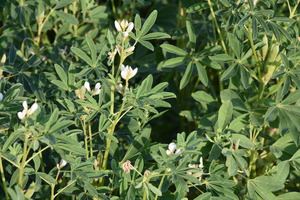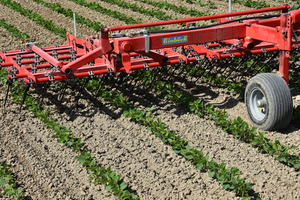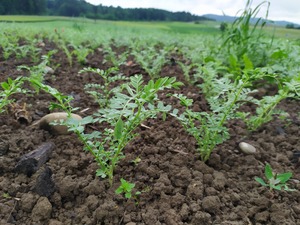Case study 20: Switzerland: Intercropping for species other than peas and faba beans in association with cereal
Cluster 4: Diversification through intercropping, with a special focus on grain legumes
The production of grain legumes has regained importance due to the increasing demand for organic protein. Thus, the case study focuses on the development of new systems to produce organic soya and lupines under Swiss climatic conditions. Additionally, the case study endeavours to increase the production and supply of white lupines, soya and chickpeas for human nutrition.
What were the main problems underlying the emergence of the case study?
The cultivation of grain legumes, such as peas, considerably decreased in 2008 due to lodging, which resulted in a higher risk of late weed infestation. The low yields had reduced the organic pea area to only 50 hectares in Switzerland and the home-grown protein production only provided 3 % of the domestic demand. The situation has improved with the development of mixed crops (peas with barley or field beans with oats) to approximately 1000 ha in Switzerland, representing around 10 % of the domestic demand. At the same time, the demand for protein has steadily increased due to a higher production of organic eggs and pork. Foreign imports have increased accordingly. However, Chinese soya (which was banned) had to be replaced by European soya in 2018, and Bio Suisse (the association of Swiss organic farmers) will ban all protein imports for ruminants from 2022 and also restrict the use of feed concentrates to 5 %. This small share of concentrates in the feed intake should contain high-quality protein. Soya and lupine are the main candidates in that regard. The goal is to produce around 2000 to 3000 ha of soya and lupines for ruminants in Switzerland by 2022 and, at the same time, expand the production of white lupines, chickpeas, peas and faba beans for human consumption on a small scale.
How was the problem addressed and which actors were involved?
In 2017, the project "Organic soya and lupines for feed" was developed in collaboration with Bio Suisse. The Research Institute of Organic Agriculture (FiBL) was responsible for the technical cultivation, crop development and advisory issues, while Bio Suisse coordinated the network of feed mills (Mühle Rytz, Lindmühle, fenaco, Grüninger) and set the prices with the industry.
In the project on proteins for human nutrition, we worked with a small processor (Tofurei Engel) since the two main Swiss retailers are currently rather sceptical. One of them is not very interested because of the high production costs in Switzerland. The other would be interested, but will not carry out the industrial processing of white lupines due to the regulated Bio Suisse extruder process. There have been positive advancements regarding this regulation that clearly hindered the Swiss organic market from being developed. Since 1 January 2021, the upper pressure limit has been increased to 20 bar, with a temperature limit of 120°C. However, it is not yet clear whether this change will be sufficient to foster the development of white lupine production.
In 2020, we realised that we did not make substantial progress with small processors since they do not have the human resources to develop new products. As a result, intensive discussions took place with Coop (one of the main Swiss supermarkets) and Hilcona (a subsidiary in Liechtenstein) on the promotion of indigenous grain legumes. FiBL has entered a new project for human nutrition with a focus on hummus processing: We were able to set up three new trials with chickpeas and one trial with field beans for human nutrition.
Solution investigated
Different intercropping systems were tested in the past, such as peas with barley or faba beans with oat. Different varieties were also tested to find the same maturity point and, finally, the same harvest point.
The case study focuses on the growing of different varieties of soya, lupine and chickpeas and comparing them to the standard varieties. Different cultivation techniques were compared with each other (intercropping, relay intercropping, and under-sowing compared to pure crops). Solutions for the strong weed competition are also being tested. Regarding the production of white lupine, we found two suitable varieties (resistant against anthracnose) that are commercialised on the organic market. FiBL trials on white lupines have confirmed their relevance. Also, these two varieties are suitable for human consumption.
Expected outcome
- Establishing organic soya and lupine production for feed in Switzerland on a large scale.
- Production and processing of organically produced white lupines and chickpeas for human consumption on a small scale.
- Finding new methods to stabilize the yield of organic soya, lupines and chickpeas.
- Finding new ways to reduce the danger of a complete weed infestation, especially at the end of the growing period.
- Developing new and low-input systems to produce soya, lupines and chickpeas without any chemical inputs.
- Exchanging knowledge with other project partners.
Relevance to the DiverIMPACTS goals?
This case study is contributing to both a more diversified agricultural landscape and organic rotation, with lower impacts on the environment and the production of ecosystem services. The environmental benefits come from a lower use of inputs in such systems. Furthermore, the different implemented techniques in organic agriculture can also inspire the conventional sector and lead to further positive impacts. Finally, the market of grain legumes is also being developed by diversifying the range of outlets.
Case study legacy
On the 1st of January 2021, the extrusion process regulation for Swiss organic legumes significantly changed. In particular, the upper pressure limit was increased to 20 bar. In theory, this has opened more possibilities for the processing of Swiss legumes and related markets. A project idea was discussed around this topic but there has been no further steps. However, this discussion has contributed to the development of another project on chickpeas with the Swiss retailer Coop. This project specifically aims to develop field trials to improve chickpea production for human consumption and will still be running after the end of DiverIMPACTS. This maintained relationship with Coop is expected to contribute to the trend towards more vegetarian and vegan food based on legumes or vegetable proteins.
Further information
Case study team
- Hansueli Dierauer, FiBL, case study leader
- Sylvain Quiédeville, FiBL, case study monitor



 tap and then scroll down to the Add to Home Screen command.
tap and then scroll down to the Add to Home Screen command.